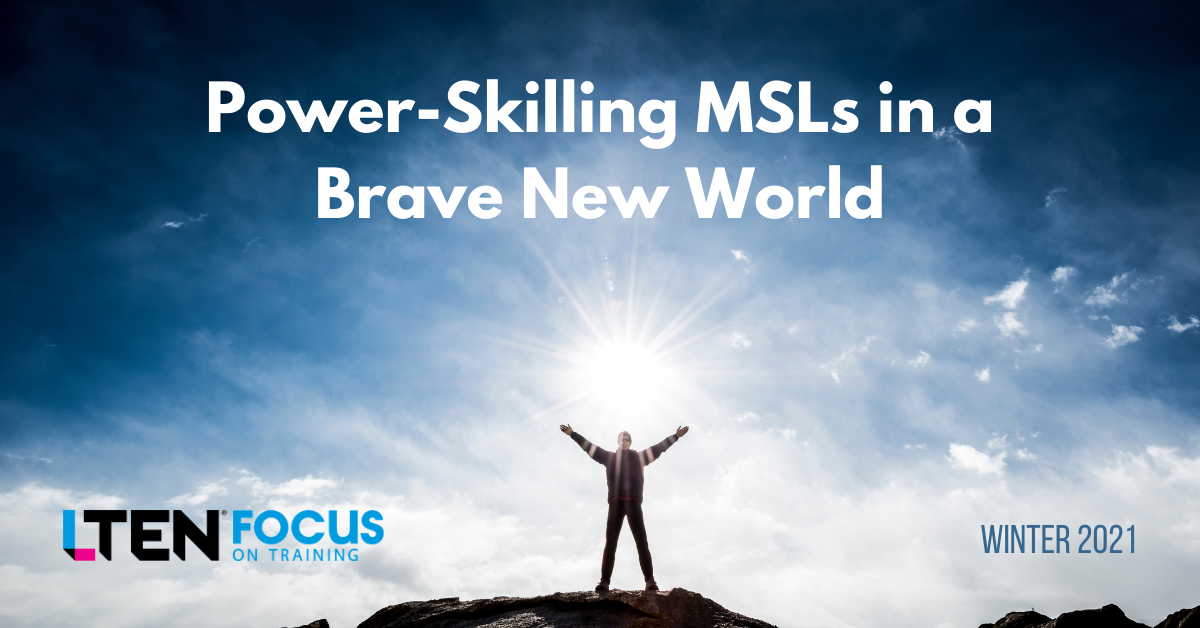
Power-Skilling MSLs in a Brave New World
COVER STORY – By Kelly Rebmann
We are seeing a ‘new world order’ that affects all those in customer-facing roles.
Historically, the focus of life sciences product marketing efforts was on sales teams, and the training effort and spend reflected that. But with increasing numbers of physicians and practices restricting sales access and the remaining accessible doctors spending less time with reps, the role of the medical science liaison (MSL) is taking on a greater significance. However, MSL training has not kept pace. This imbalance needs correction.
My organization has found a way to balance the scales between Sales and Medical training and between hard and “soft” skills, now called power skills. We can prove the success of this balancing act with external research that show our MSLs’ Net Promoter Scores (NPS) are dramatically higher than other teams across the industry.
Interaction Shifts
Some research suggests that doctors prefer to interact with those who have similar educational experiences, i.e., those they consider to be on more of a peer level. They perhaps deem MSLs more credible because they do not have promotional responsibilities. However, a dramatic rep-to-MSL interaction shift has not (yet) materialized.
Whether or not the MSL role expands and/or replaces the traditional sales rep role remains to be seen. But what we are seeing with the “new world order” caused by the COVID-19 pandemic are trends that negatively affect all those in customer-facing roles, whose tasks depend on successfully interfacing with healthcare professionals (HCPs):
-
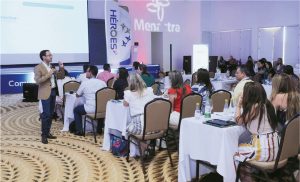
Kocfa Chung, medical trainer and learning architect, global medical learning and capabilities development for Sanofi Pasteur Medical, conducts power skills training in Zhejiang, China.
No or few live interactions.
- HCP preference for email or phone contact over virtual video engagements.
- Decreased time spent in engagements.
- Challenges in gaining first contact and establishing new relationships.
I work for one of the top vaccine manufacturers in the world and a company with two COVID vaccine candidates in development. Our MSLs have a great deal of exclusive and valuable information to offer. Yet, they still report experiencing challenges in engaging key opinion leaders (KOLs) or engaging them for long. So, it’s not a stretch to assume that MSLs industry-wide are experiencing the same issues, and sales reps have it worse.
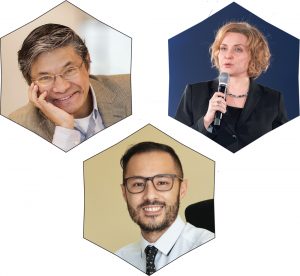
Members of the Sanofi Pasteur Medical training
team, more formally known as Medical Learning
and Capabilities Development (ML&CD) team,
from top left: Jorge Fragoso, manager, global
medical learning and capabilities development;
Kelly Rebmann, head, global medical learning
and capabilities development; and Kocfa Chung,
medical trainer and learning architect, global
medical learning and capabilities development.
Power Skills Solution
What should we, in the learning and development (L&D) space, be doing to support the non-commercial customer-facing teams for the short- and the long-term? The short answer is to develop their power skills. Competence in self-awareness, navigating stress, demonstrating empathy and building connections is what distinguishes outstanding performers from average ones.
This is especially true in times of volatility, uncertainty, complexity and ambiguity (VUCA). With the new business norms driven by the pandemic, we are certainly in times of VUCA, and we need to focus intently on building these skills in our people and teams.
In Medical Affairs, the over-arching objective is to hire experts in science and medicine, shape them into subject matter experts and then ensure they build the dimensional skills that allow them to drive medical and business outcomes. Organizations typically hire people who demonstrate excellence and experience in scientific disciplines, ensuring that their therapeutic area and product knowledge is satisfactory, easy and straightforward. What is less straightforward — and often overlooked — is a focus on building the foundational skills that will allow them to:
- More effectively communicate complex scientific information.
- Initiate and develop long-lasting, trusting relationships.
- Think strategically about patient, customer, public health and business needs.
Building “power” skills is typically not a focus in medical or pharmacy school. The stereotypes of the brilliant doctor with a terrible bedside manner or the loveable doctor who loses their practice because they can’t manage the business aspects are born from at least some grains of truth.
One might argue that those who are attracted to highly scientific roles are not always naturally inclined to the arts of conversation, connection and enterprise thinking – perhaps in contrast to those in sales roles. The talent of memorizing the names and locations of 12 cranial and 31 spinal nerves is very different from the talents of settling a dispute, gaining consensus or seeing the long view of strategic decisions. So, organizations often have great scientists who have a list of “softer” areas in need of attention.
Perhaps the best opportunities to support the development of an MSL field force is to strengthen these four foundational areas:
- Interpersonal Relationships
- Effective Communication
- Strategic Thinking
- Business Acumen
Interpersonal Relationships
For the past several years, we partnered with a company called Insights. Their main premise is that self-awareness is the foundation for driving personal and business success. We used their Insights Discovery evaluation and content to create and host an ongoing training series. This program helped our medical team understand their communication style and how to adapt their styles to others’ preferences and needs. It allowed us to embed a common language and communication approach.
Participants reported improved awareness and confidence. They demonstrated improved adaptability, collaboration and conflict resolution. The program proved effective, and, because it uses primary colors as the reference points, it was simple to understand and fun to use. There are a variety of psychometric assessment tools available to help people enhance their EI and communication skills. The tools and their associated programs can be useful in helping people to build long-lasting relationships and networks.
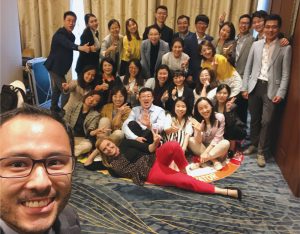
Kocfa Chung, medical trainer and learning architect, global medical learning and capabilities development for Sanofi Pasteur Medical, snaps a shot with Kelly Rebmann and the China Medical team during power skills training in Shenzhen.
Effective Communication
For effective communication in the MSL world, we must get three things right: the science, the story and the slides. The science must be correct (and valuable). The story must be compelling (and logical). The slides must be complementary (and visually appealing).
Our communication skilling efforts focused on the story. We partnered with a boutique L&D vendor, Creter Group, to design and facilitate custom training courses on scientific engagement, specifically in presentation skills and storytelling. We could have picked off-the-shelf courses in either subject. However, our belief was that presenting highly complex content in a relevant, compelling way to KOLs and managing their questions is very specialized. Luckily for us, we added a strong section on managing virtual presentations long before the pandemic skidded into our lives, so our global MSL team was well prepared to engage HCPs professionally via screens when the time came.
Our efforts in building interpersonal relationships and effective communication skills over the past several years have borne excellent results. Research published by Clear Point Health in late 2019 showed our NPS – the willingness of KOLs to recommend engaging with our MSLs to other colleagues – to be twice as high as other MSL teams across the pharmaceutical industry. A true testament to our attention to science plus soft skilling!
Strategic Thinking and Business Acumen
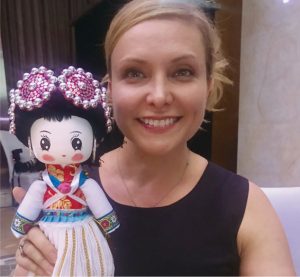
Kelly Rebmann in Kunming, China, where the team gave her a doll in traditional costume, representing a local faction in the Yunnan
Province.
Modern medical professionals who join a pharmaceutical company from academia or from practice are typically lacking in strategic thinking and business acumen, as compared to their commercial counterparts. This is a distinct disadvantage.
Marketing teams run strategic planning, but Medical needs to have a strong understanding of how strategic decisions are made and the process by which this is accomplished. This knowledge allows them to contribute, partner and drive where appropriate. We created custom training with specific learning objectives:
- Ensure Medical’s knowledge of the strategic planning process, language and how business choices are made.
- Position Medical to engage more strongly and confidently in planning and to contribute in more high-quality ways.
- Enhance Medical’s overall strategic-thinking capabilities.
Our training effort was directed at all Medical Affairs personnel, as all contribute to brand planning in different but important ways. In our pilot effort, we trained more than 40% of the Medical team.
Prior to our training, a survey was conducted to illuminate the contribution of various business functions to the development of brand plans. Medical ranked the highest among functions but with a score of only 26%. The survey was conducted again a year later, and the active participation of Medical in brand planning increased from 26% to 81%. This dramatic improvement was a testament to the importance of business skills training for Medical Affairs.
Conclusion
If we have MSLs who know everything there is to know about disease states but they can’t connect with the doctor across the table (or through the video screen) to communicate the information effectively, then it doesn’t matter how much they know. If we have Medical personnel who understand the science but not how to apply it to business strategy, we are hampering their ability to provide key insights that can result in real health value to patients.
As L&D personnel, we need to convince our organizations that a balanced training offering focused equally on science and power skills is how we build MSLs to meet the needs of our stakeholders, today and in the future.
Critical MSL Power Skills
Interpersonal Relationships
✓ Possesses emotional self-awareness and demonstrates social skills with others.
✓ Builds effective, long-lasting relationships based on honesty, trust and credibility.
✓ Impacts people, processes and outcomes in a positive way.
Effective Communication
✓ Presents information in a way best received and understood by the recipient.
✓ Delivers complete, concrete, accurate, credible, compliant information in a clear, concise, engaging manner.
✓ Identifies communication preferences and adapt style accordingly.
Strategic Thinking
✓ Seeks fact-based data to define current state and creates or facilitates buy-in of future state vision.
✓ Demonstrates a systems perspective.
✓ Identifies opportunities and prioritizes choices/options.
Business Acumen
✓ Understands business operations, interdependencies, trade-offs and growth/profitability drivers.
✓ Creates and executes tactics according to business and medical strategy with customer-centricity.
✓ Mines insight from information and uses it to ensure that the value proposition(s) of the company and its products are fully understood.
Kelly Rebmann is head, global medical learning and capabilities development Sanofi Pasteur Medical. Email Kelly at kelly.rebmann@sanofi.com. The views and opinions expressed in this article are those of the author and should not be attributed to the author’s employer.








